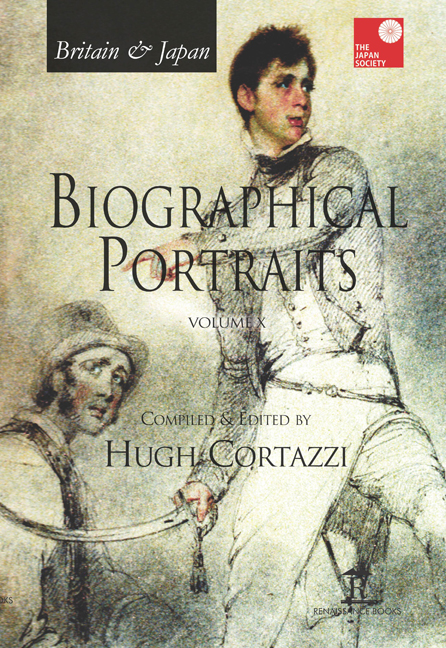Book contents
- Frontmatter
- Dedication
- Contents
- Introduction
- List of Contributors
- Index of Biographical Portraits in Japan Society Volumes
- PART I BRITAIN IN JAPAN
- PART II JAPAN IN BRITAIN
- Select Bibliography of Works in English on Anglo-Japanese Relations [Compiled by Gill Goddard – Retired East Asian Studies Librarian, University of Sheffield]
- Select Bibliography of Works in Japanese on Anglo-Japanese Relations [Compiled by Akira Hirano, SISJAC]
- Index
61 - Itō Michio (1892–1961): Dancer and Producer
Published online by Cambridge University Press: 07 May 2022
- Frontmatter
- Dedication
- Contents
- Introduction
- List of Contributors
- Index of Biographical Portraits in Japan Society Volumes
- PART I BRITAIN IN JAPAN
- PART II JAPAN IN BRITAIN
- Select Bibliography of Works in English on Anglo-Japanese Relations [Compiled by Gill Goddard – Retired East Asian Studies Librarian, University of Sheffield]
- Select Bibliography of Works in Japanese on Anglo-Japanese Relations [Compiled by Akira Hirano, SISJAC]
- Index
Summary
EARLY LIFE
ITŌ MICHIO was born on 13 April 1892 as the third of nine children born to Itō Tamekichi and Kimi’e in Kanda, central Tokyo. His father was an inventor and architect, who manufactured a mechanized coach at the age of sixteen, although it failed to run as fast as he hoped. He opened Japan's first dry-cleaner, produced pioneering modern furniture, designed some of Tokyo's landmark buildings, became the first Japanese engineer who constructed a seismic building, and presented as a gift to an arctic expedition team a set of materials from which a prefabricated house could be reassembled within three hours. His mother was a descendant of the chief retainers of the Hamamatsu clan and a society lady who frequented the balls, garden parties and bazaars held at the Rokumeikan in Tokyo.
Tamekichi had three more children by a mistress and all his nine sons grew up to be artists except for two of them who died young. Michio's younger brother, Kanae, was an architect like his father, Yūji, a musician and stage designer, Kisaku, a set designer, Kunio, better known as Senda Koreya, one of the greatest actors and producers in the modern Japanese theatre, Teiryō, an architect, and Ōsuke, a composer and guitarist. Tamekichi's eldest daughter married an army general,and his second oldest daughter, although she was not an artist herself, married one of the most renowned modernist painters, Nakagawa Kazumasa, and her half-sister became a musician.
Their parents, however, never expected or wanted their children to become artists but rather had a clear vision of the elite career path that they should follow, that is, to go to the First Higher School and then the Imperial University of Tokyo to qualify as engineers. Michio showed a strong interest in music for the first time when he purchased a harmonica and then a violin. His mother who was a puritanical believer in discipline and asceticism, although she herself was a lover of the theatre and dancing, and had been a society woman, disapproved of Michio playing his harmonica at home. His harmonica was quickly confiscated, but he saved more pocket money to purchase another one. The several harmonicas that he bought in this way all ended up in the back of a drawer of his mother's cabinet.
- Type
- Chapter
- Information
- Britain & Japan Biographical Portraits Vol X , pp. 693 - 704Publisher: Amsterdam University PressPrint publication year: 2016

